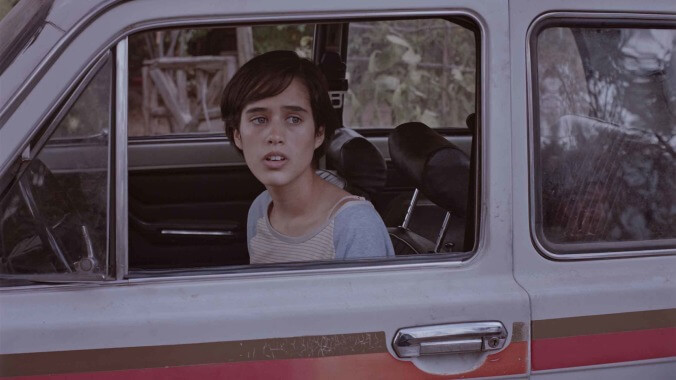Too Late To Die Young brings memories of an unusual childhood to transfixing life


Set entirely at a commune nestled in the hills above Santiago, Dominga Sotomayor’s lovely, ramshackle coming-of-age drama Too Late To Die Young is one of those films so specific in its random details that it’s instantly identifiable as autobiography. On the festival circuit last fall, it wound up overshadowed by Roma, with which it even coincidentally shares one memorable sequence: a cataclysmic forest fire as the new year rings in. But while Sotomayor’s re-creation of her childhood memories—she spent her formative years in Peñalolén, a commune that still exists today—may not be as meticulously, obsessively art-directed as Alfonso Cuarón’s (in part simply because she grew up in far less material comfort), it feels every bit as vivid in terms of lived experience. There are a handful of narrative through-lines—a dog goes missing, a romance burgeons—but they ultimately seem less important than such fleeting sensory interludes as a teenage girl watching the smoke from her cigarette do battle with the steam rising from her bath. For better and worse (mostly better), Too Late To Die Young is a mood movie, situated on an emotional precipice.
The nature of that precipice may elude viewers unfamiliar with Chilean history; the film assumes its audience will understand the significance of it taking place late in 1990. (For a highly entertaining primer on what had just happened in the country politically, watch Pablo Lorraín’s No.) Augusto Pinochet’s brutal military dictatorship has finally ended, and the unaccustomed freedom that that entails is magnified by the offbeat living arrangement this group of families has chosen: a hippie-style collective setting them apart from society (as well as from electricity, and sometimes from running water). It’s a playground for the younger kids, but 16-year-old Sofia (Demian Hernández) feels more ambivalent, as she’s itching to join the wider world that these adults have deliberately left behind. Her desire to escape the escape that’s been imposed upon her intensifies each time she sees Ignacio (Matías Oviedo), a hunky twentysomething guy with a motorcycle who’s related to some commune dwellers but doesn’t live there himself. That doesn’t go unnoticed by Lucas (Antar Machado), a boy of roughly Sofia’s age who would clearly prefer to be more than her best friend.
This awkward love triangle would be firmly at the center of a more conventional nostalgia piece. Here, it’s merely one of numerous threads weaving in and out of a loosely knit tapestry. The lack of momentum can occasionally be frustrating, as is often the case with cinematic memoir: Although Sotomayor appears to have been only 4 years old in 1990—she must have moved the timeline back for political reasons, which perhaps explains why Mazzy Star’s aching 1993 heart-crusher “Fade Into You” anachronistically turns up on the soundtrack not once but twice—she vividly remembers this time of her life, and probably didn’t want to omit anything that’s been tugging at her psyche for decades. Right up to its climactic conflagration, the film seems headed nowhere in particular.
Still, individual scenes and moments are so consistently engaging that Too Late To Die Young generally feels spontaneous rather than aimless. While the end of Pinochet’s rule remains implicit throughout—if anyone mentions it, they do so only in passing—everyone on screen thrums with pent-up energy. A preteen girl named Clara (Magdalena Tótoro) spends much of her time searching for her family’s dog, Frida, which ran off into the woods, and it’s unclear whether she’s concerned for the mutt’s safety or yearns to join her on her reckless adventure. (Eventually, Clara’s mother attempts to solve the problem by buying a similar-looking dog from another family.) Repeated discussions regarding the availability of fresh water and whether or not to install electricity have the flavor of a city council meeting, underlining the theme of self-governance. Sofia’s romantic entanglement is slightly complicated by the fact that she gets her advice about navigating the adult world primarily from Lucas’ mother (Antonia Zegers, one of Larraín’s regular actors; she appears in No as well). The question of how people should live together is at the heart of everything we see.
What’s more, there is ultimately a destination, in the form of the commune’s big New Year’s Eve talent show, for which everyone spends much of the movie preparing. (One kid, blissfully unaware of what the future holds, practices a Michael Jackson routine.) Too Late To Die Young’s fiery climax, for which none of the characters is remotely prepared, occurs the following day, and retroactively provides the sense of urgency that had been missing. Even then, though, not everyone is aware that something significant has happened. Sometimes, you’re just off in your own world, whether or not that’s the designated refuge.